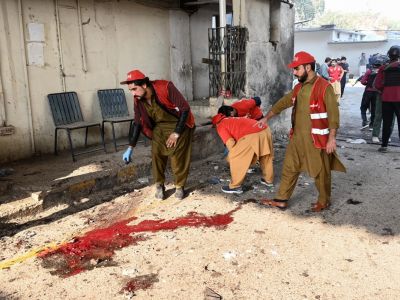The entry of Arab states into the World Trade Organization (WTO) will be extensively reviewed during a conference in Beirut on October 31, reported the Daily Star newspaper on Saturday.
The conference, entitled Liberalization of Trade in Services in the Arab World, will be attended by 500 participants, including 17 Arab ministers.
Organized by the Union of Arab Banks and the Economic and Social Commission for Western Asia (ESCWA), the conference will examine a list of proposals that would make it much easier for the Arab states to join the WTO.
A senior official from ESCWA said some of the speakers at the conference will focus on the conditions to join the WTO prior to the organization’s forthcoming summit in Doha, said the paper.
He added that many documents concerning the WTO were prepared by ESCWA and other speakers to help Arab states better understand the concept of the trade organization.
Apart from WTO, the participants will also discuss the liberalization of trade in services in the Arab states.
Lebanon is set to sign a partnership agreement with the European Union before the end of this year.
The agreement calls for the gradual removal of all trade barriers between Lebanon and the EU.
The Lebanese government has already reduced Customs duties on most imports and intends to introduce the value-added tax next year.
The conference will urge the Arab countries to focus on liberalization of cross-border trading, with special emphasis on banking services.
Lebanon’s Central Bank Governor Riad Salameh said that globalization has become a reality and that Lebanon and the Arab states should prepare themselves for it.
He added that Lebanese banks are not too concerned about competition from outside, adding that foreign banks in Lebanon have only 18 percent of the market share.
Among the other subjects discussed by speakers are the role of trade in financial services; liberalization of trade in tourism and liberalization of trade in telecommunications.
Meanwhile, trade representatives meeting in Mexico City were set for a potentially tough eight-hour session Saturday, in what a participant described as "the beginning of the endgame" toward a proposed new round of global market-opening talks, said AFP.
The ministers from 15 countries, Hong Kong and the European Union, as well as World Trade Organization (WTO) Director-General Michael Moore already held a series of bilateral meetings on Friday.
Participants at the informal meeting said the talks aimed at narrowing differences, notably between rich and poor countries, over the proposed new round that could be launched at the November WTO meeting in Doha.
"The idea is to identify what tough issues need to be crunched, so they are not left to be resolved at Doha," said a senior Canadian official who asked not to be named.
He stressed this was not a make-it or break-it meeting, but "the beginning of the endgame."
Agricultural and other subsidies by rich nations were a crucial topic at the talks. Poorer countries say the measures amount to unfair competition for their exports.
The European Union dismissed criticism of its farming subsidies, saying it has done far more than the United States, Canada or Japan to allow access to agricultural exports from poor countries.
Anthony Gooch, the spokesman for European Trade Commissioner Pascal Lamy, said the EU had essentially dropped all import duties and quota fees for agricultural exports from the world's 49 poorest countries.
"Ask the Americans, the Canadians and the Japanese if they would be willing to do the same," Gooch told AFP.
He pointed out that the EU decided to go it alone in dropping restrictions for the world's poorest countries in March, after the United States and Japan declined a proposal to do so jointly.
Anti-dumping measures and full implementation of the Uruguay pact of 1994 are also among the top issues the ministers hope to hammer out in Mexico City.
A key question is how broad the agenda of a new round would be.
According to AFP, some officials were optimistic consensus may be reached on the issue, saying the United States have recently warmed to the European Union's call for a wider agenda.
But officials stress a lot of differences remain to be solved, notably as developing nations say they have received only limited benefits from the previous round of talks.
Indian trade officials claim the developed world has out-benefited other WTO members 7.5 to one since the Uruguay round concluded in 1994.
Several participants said it was essential a broad consensus eventually should be reached to avoid a repetition of the 1999 WTO meeting in Seattle, where an attempt to launch a new round collapsed amid deep divisions between developed and developing countries.
Moore was confident this could be done.
"There has to be something in this for everybody," he told journalists at the Mexico City meeting.
"Nobody totally wins, nobody totally loses. We hope we can get a balanced result," the former New Zealand Prime Minister said.
As the ministers met behind closed doors at a hotel in the Mexican capital, dozens of globalization foes, some dressed as insects and others on horseback protested outside.
Ministers from Argentina, Australia, Brazil, Canada, the European Union, Egypt, Hong Kong, India, Jamaica, Japan, Mexico, Singapore, South Africa, Switzerland, Tanzania, the United States and Uruguay were at the talks – Albawaba.com
© 2001 Al Bawaba (www.albawaba.com)









